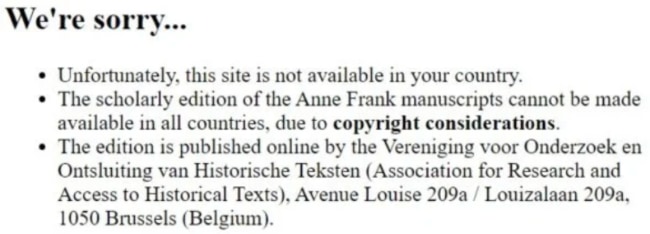
“Anne Frank” Copyright Dispute Raises Critical Questions About VPNs and Geo-Blocking
- A very complex copyright case that tackles blocking online content based on geographical location challenges the use of VPNs.
- Anne Frank's manuscripts are blocked in the Netherlands due to copyright issues, and rightsholders argue that geo-restrictions are futile.
- The way this case unfolds could impact employ entities that use geo-blocking as a licensing enforcement strategy.
The Dutch Supreme Court has sought guidance from the Court of Justice of the European Union (CJEU) on a complex case involving geo-blocking, VPNs, and copyright law on the online publication of Anne Frank's manuscripts by the Dutch Anne Frank Stichting.
The publishing company is currently prohibited from offering access to Dutch visitors due to existing copyright laws in the Netherlands. The original manuscripts of Anne Frank remain under copyright protection in the country until 2037, even though early versions are considered public domain in several countries.
This discrepancy arises because parts of the manuscript were first published as late as 1986, thereby extending Dutch copyright protections.
The Anne Frank Fonds, which manages the rights to the manuscripts, has taken legal action, arguing that current geo-blocking measures are insufficient due to their vulnerability to circumvention via VPNs.
The Fonds insists that, despite these technological measures, the availability of the manuscripts online constitutes a communication to the public in the Netherlands.
Lower courts in the Netherlands have dismissed the Fonds' appeals, acknowledging that the defendants have deployed state-of-the-art geo-blocking alongside other preventive measures, such as user declarations to restrict access.
The Courts noted that bypassing geo-blocking with VPNs does not inherently constitute a type of communication to the public in restricted territories, as per the GO4YU case, unless the blocking efforts are intentionally inadequate.
Currently, the Dutch Supreme Court has posed three pivotal questions to the CJEU, one of which is whether a "communication to the public" is only established if a website is specifically directed at a particular country, asking the details of what precisely constitutes such 'direction.’
Another question focuses on whether advanced geo-blocking measures, which can still be circumvented by VPNs, equate to a "communication to the public." The last question is if the CJEU determines that bypassing geo-blocks with VPNs results in a communication to the public, it implies a breach of copyright law.
The CJEU's forthcoming ruling has the potential to significantly redefine the online content distribution landscape, affecting streaming services, digital publishers, and other platforms that employ geo-blocking as a licensing enforcement strategy.
In other recent news, California-based PCR Distributing filed a copyright infringement lawsuit against the popular adult site nHentai. The lawsuit alleges that the website distributes copyrighted content without permission and has failed to respond to multiple DMCA takedown notices.








